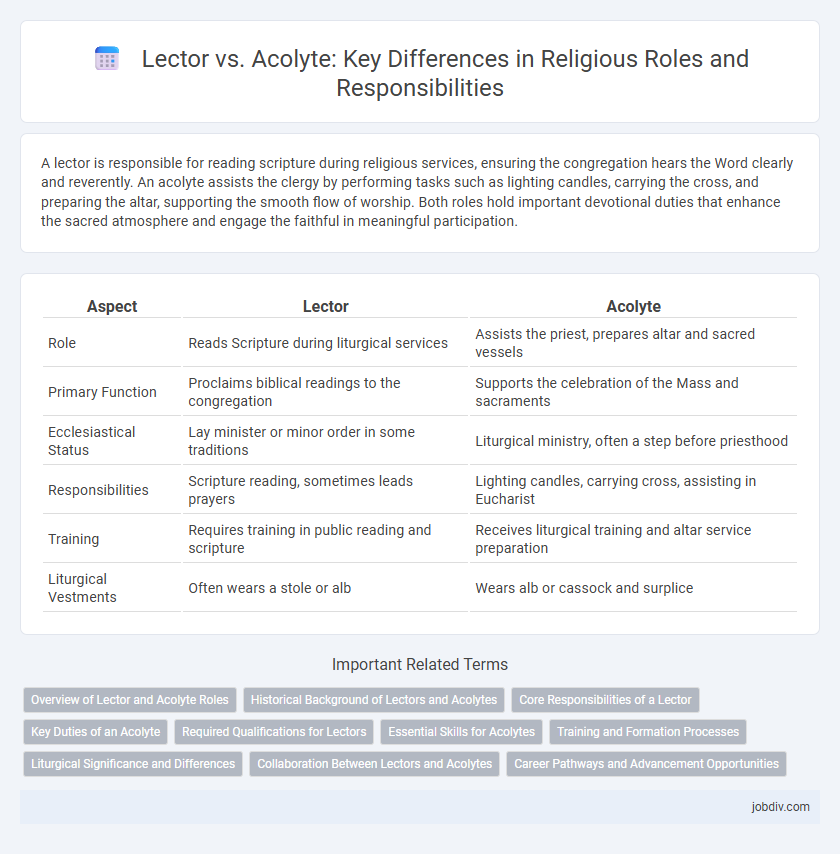A lector is responsible for reading scripture during religious services, ensuring the congregation hears the Word clearly and reverently. An acolyte assists the clergy by performing tasks such as lighting candles, carrying the cross, and preparing the altar, supporting the smooth flow of worship. Both roles hold important devotional duties that enhance the sacred atmosphere and engage the faithful in meaningful participation.
Table of Comparison
| Aspect | Lector | Acolyte |
|---|---|---|
| Role | Reads Scripture during liturgical services | Assists the priest, prepares altar and sacred vessels |
| Primary Function | Proclaims biblical readings to the congregation | Supports the celebration of the Mass and sacraments |
| Ecclesiastical Status | Lay minister or minor order in some traditions | Liturgical ministry, often a step before priesthood |
| Responsibilities | Scripture reading, sometimes leads prayers | Lighting candles, carrying cross, assisting in Eucharist |
| Training | Requires training in public reading and scripture | Receives liturgical training and altar service preparation |
| Liturgical Vestments | Often wears a stole or alb | Wears alb or cassock and surplice |
Overview of Lector and Acolyte Roles
Lectors serve as proclaimers of Scripture during liturgical celebrations, reading sacred texts to guide the congregation in faith. Acolytes assist the clergy by preparing the altar, handling sacred vessels, and supporting the liturgical functions to ensure reverence and order during worship. Both roles are essential ministries that enhance the solemnity and active participation of the faithful in Catholic rituals.
Historical Background of Lectors and Acolytes
Lectors and acolytes have distinct historical roles within Christian liturgical traditions, dating back to the early centuries of the Church. Lectors were originally tasked with reading Scripture during worship services, a role formalized in the early Church to ensure proper proclamation of biblical texts. Acolytes evolved as attendants assisting clergy, primarily responsible for lighting candles, preparing the altar, and supporting the ceremonial aspects of the Mass, with this office developing significantly during the Middle Ages.
Core Responsibilities of a Lector
A Lector's core responsibilities include proclaiming Scripture readings during liturgical services, ensuring accurate and reverent delivery of the Word of God to the congregation. This role demands clear articulation, strong understanding of biblical texts, and the ability to engage the assembly spiritually. Unlike the Acolyte, whose duties focus on assisting the priest and preparing the altar, the Lector is primarily dedicated to the ministry of the spoken Word within the Mass.
Key Duties of an Acolyte
An acolyte's key duties include assisting the clergy during liturgical services by preparing altar vessels, lighting candles, and carrying processional items. They play a crucial role in ensuring the smooth flow of the Mass or other religious ceremonies, often supporting the priest and deacon in ritual actions. Serving as an acolyte also involves maintaining reverence and order at the altar, contributing to the solemnity of worship.
Required Qualifications for Lectors
Lectors must possess a clear and strong voice, demonstrating the ability to read scripture fluently and reverently to ensure the congregation's full comprehension. They should exhibit a deep understanding of liturgical texts and maintain a respectful demeanor befitting their role in the worship service. Training in public speaking and scriptural interpretation is often required to fulfill the responsibilities of a lector effectively.
Essential Skills for Acolytes
Acolytes require essential skills such as carrying processional candles, assisting in the preparation of the altar, and understanding liturgical gestures to support the clergy effectively. Their role demands attentiveness to ceremonial details and the ability to follow precise ritual movements. Unlike lectors who primarily focus on reading scripture, acolytes engage in hands-on tasks essential for the smooth conduct of worship services.
Training and Formation Processes
Lectors undergo rigorous biblical literacy and public speaking training to effectively proclaim Scripture during liturgical services, emphasizing clear pronunciation and reverent delivery. Acolytes receive specialized formation in altar service, including the handling of sacred vessels, lighting of candles, and assisting the presider, ensuring proper liturgical protocol is maintained. Both roles require participation in diocesan workshops or parish catechetical programs to deepen understanding of their distinct liturgical functions and spiritual responsibilities.
Liturgical Significance and Differences
Lectors hold the liturgical role of proclaiming Scripture readings during Mass, emphasizing the importance of the Word of God in worship, while acolytes serve by assisting the priest and deacon, often preparing the altar and handling sacred vessels. The distinction lies in their sacred duties: lectors primarily focus on delivering the biblical texts with clarity and reverence, whereas acolytes ensure the orderly conduct of the liturgical ceremony through practical support. Both roles are integral in enhancing the solemnity and flow of the liturgy, reflecting different facets of active lay participation in the Catholic Mass.
Collaboration Between Lectors and Acolytes
Lectors and acolytes collaborate closely in liturgical settings, enhancing the solemnity and flow of worship services through complementary roles. Lectors primarily focus on proclaiming Scripture readings with clarity and reverence, while acolytes assist by preparing the altar, carrying candles, and supporting the celebrant in rituals. Their teamwork ensures a seamless liturgical experience that deepens the congregation's engagement and spiritual reflection.
Career Pathways and Advancement Opportunities
A Lector primarily serves by reading scripture during liturgical services, which can lead to further roles in church ministry such as becoming a Catechist or Pastoral Assistant. An Acolyte assists in altar service, often serving as a stepping stone toward ordained ministry, including roles like Deacon or Priest. Both positions offer foundational experience and visibility that enhance advancement opportunities within ecclesiastical career pathways.
Lector vs Acolyte Infographic

 jobdiv.com
jobdiv.com